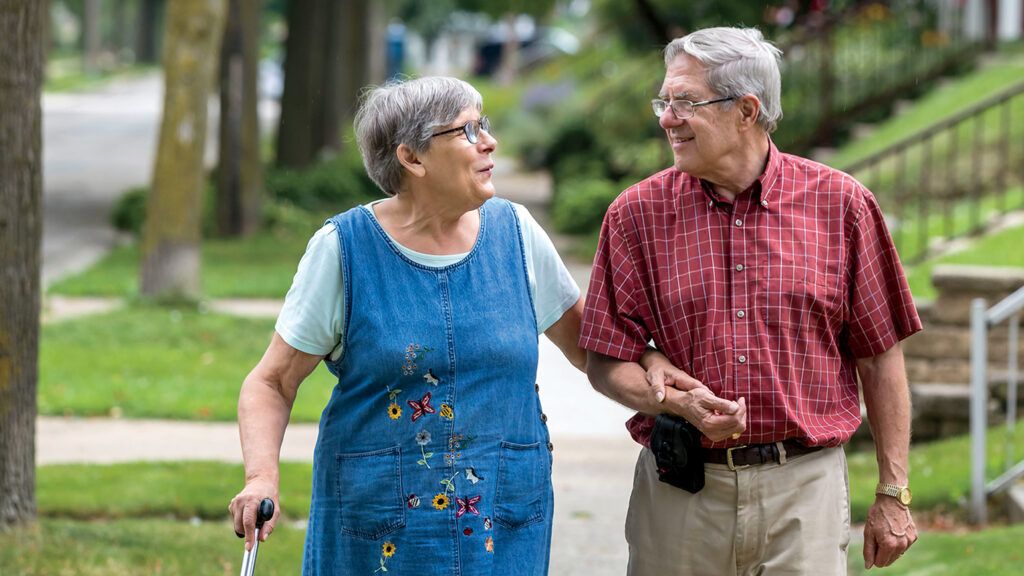I pray through the Book of Psalms every month, reading a few psalms each day, a practice I’ve kept since well before becoming a pastor. Now that I’m retired and taking care of my wife, Candy, who has Alzheimer’s, almost every day there’s a verse or two that speaks to what we’re dealing with.
The boundary lines have fallen for me in pleasant places; I have a goodly heritage.… You show me the path of life. In your presence, there is fullness of joy; in your right hand are pleasures forevermore. (Psalm 16:6, 11)
Candy loves to tell people the story of how we met. She was a student at a small Minnesota college. I transferred there in my junior year. I showed up in the cafeteria for breakfast my first day on campus and sat down at her table. She asked me where I was from. Oakland, California, I told her. Well, how did I get here to St. Paul, Minnesota?
Turned out, the man who had picked me up at the airport and driven me to campus was the pastor of her church. I knew him because he’d been the youth pastor of my church back in California. Moreover, the current pastor of my home church had been the man who married Candy’s parents many years before. The story is a little complicated, but she still always gets the details just right, ending with the rhetorical question, “Don’t you think God put us together?”
Our meeting is one of the happiest memories of our life. It fills me with joy and gratitude every time I hear Candy retell it.
Even though I walk through the darkest valley, I fear no evil; for you are with me. (Psalm 23:4)
The Twenty-Third Psalm may be the best known and most loved passage in the Bible. In the King James Version, the Psalm refers to “the valley of the shadow of death,” but I prefer the more recent translation, “the darkest valley,” because it so accurately describes our experience with Alzheimer’s. Take the events that led to Candy’s diagnosis three years ago. At the time, I was doing an interim pastorate in Albany, Texas, about 180 miles from our Dallas home. I was staying in Albany overnight when I was awakened by a call from the UPS Distribution Center back in Dallas: “We have your wife here. Can you come pick her up?” In the wee hours of the morning, Candy had heard music in her head and left our house to find out where it was coming from, wandering for more than a mile.
She was admitted to the hospital and underwent tests. We found out that the hallucinations she suffered from were due to Alzheimer’s.
Even with medication, the hallucinations did not go away. She’d hear noises in the attic or music on the roof. I tried to be reassuring, but sometimes I found myself as frightened as she was.
What has chased away the fear is the comfort that has come from others. From family members, doctors, friends and the Alzheimer’s Association caregiver support group I attend. Again and again in this dark valley, I have been able to say, “I fear no evil for you are with me.”
Into your hand I commit my spirit; you have redeemed me, O Lord, faithful God. (Psalm 31:5)
Anyone who has attended a Good Friday service recognizes the words that Jesus said on the cross—“Into your hands I commend my spirit”— but they may not be aware that Jesus was quoting from this Psalm as he breathed his last. When circumstances in the lives of the congregants I served were beyond my control, it helped me maintain an inner peace.
After Candy was diagnosed, our lives were upended. I retired from the ministry so I could care for her full-time. We decided to move to Milwaukee to be closer to family. We had to downsize. We had to find a new church and all new doctors. The stress of the changes was overwhelming. Repeatedly I found myself praying, “Into your hands I commit my spirit.”
One thing we brought with us to Milwaukee was our Scrabble board. Even as her disease attacks her brain in many ways, Candy is still able to play a mean game of Scrabble. Every night when we sit down and play, God’s faithfulness feels very present.
Do not cast me off in the time of old age; do not forsake me when my strength is spent. (Psalm 71:9)
One of my biggest fears? Not being able to outlive my beloved wife. Not being able to carry out my caregiving.
Neither of my grandfathers made it to 70. My father lived to be 83. He called those 13 years his bonus time. I am now 72. You could say I’ve already used up two bonus years. I don’t feel that old and don’t think I look that old, but it’s important to acknowledge where I am in this life and how much I depend on God for strength. I take care of myself. I see a counselor to deal with stress. I eat right—lots of fruits and vegetables—and get regular exercise, taking our dog for long walks.
I also do things with Candy. For years when I was a full-time pastor, she did all the grocery shopping, not only for our family but also for church. I’d give her a call and ask if she could pick up food for a meeting or for the youth group. No problem.
We shop together now, and it means me doing things her way. I’d prefer to dart in and dart out, but Candy likes to go down every aisle, checking out anything that catches her eye. And if she meets someone in the checkout line, she’ll tell them the story of how she met her husband years ago in college in Minnesota.
So teach us to count our days that we may gain a wise heart…. Let the favor of the Lord our God be upon us, and prosper for us the work of our hands—O prosper the work of our hands! (Psalm 90:12, 17)
In high school, I wanted to be a great writer. I imagined writing something so significant that people would read it after I was gone. In my years of ministry, it didn’t take me long to realize I would make a difference in other ways. Preaching, teaching, counseling. Praying for God to prosper my work as it took shape in the people I worked with, all of whom have left their indelible mark on me.
As my caregiving has transitioned from caring for a congregation to caring for my wife, I still ask God to prosper my work. I look to others for role models. At my last pastorate, the choir director’s wife had Alzheimer’s. He cared for her with such faithfulness and gentleness. They would do simple things together, like go for cones at Dairy Queen. When he conducted at church, his wife often stood up next to him. He had a lot of other demands on his time, but his wife’s needs were clearly his top priority.
Whatever I do for Candy in whatever time remains is small compared to all that she did raising our three sons and supporting me in my ministry. Prosper the work of my hands? May God use me to make these difficult days of her journey as joyful, stable and satisfying as possible.
For more inspiring stories, subscribe to Guideposts magazine.





